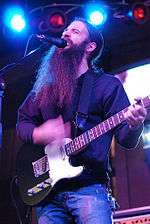Sean Michel
Sean Michel is a musician from Bryant, Arkansas. He was initially known most widely for his appearance on American Idol Season 6. However, he toured with his band for at least two years prior to his appearance on the show.
| Sean Michel | |
|---|---|
 Michel performing in South Carolina | |
| Background information | |
| Born | August 21, 1979 |
| Origin | New Orleans, Louisiana |
| Occupation(s) | Musician |
Early life and career
Michel was born August 21, 1979 in New Orleans, Louisiana. His family relocated to the Little Rock area in the early Nineties.
Beginning of Music Career
In 2003, after returning from a stint in China, Michel recruited friend and bass player Nick Taylor to play with him. By 2005 the band added drummer Joie Lyle and was touring on a consistent basis.
In 2006, Michel decided to try out for American Idol on a whim. He auditioned in Memphis, Tennessee, and then spent a lot of time in Memphis and later in Hollywood as part of his American Idol commitment. His national profile developed as his memorable audition of "God's Gonna Cut You Down" impressed the judges and when it aired in January 2007 his media exposure increased substantially.[1]
By this time, Michel was touring regularly with a full band, which spent the latter half of 2007 recording its debut full-length album. That album, titled "The Thrill of Hope", was released in December 2007.[2]
Current Music Career
Without a band following that album, Michel turned to long-time friend Andy Turner to help record a demo of the new songs Michel was writing. The independent DIY ethos that developed included a drastic departure from the more polished pop-influenced recording Michel had become wary of. Michel's "Just Let Go Demo" resulted in only a few short runs of physical copies.
During this time, Michel met guitarist Alvin Rapien, who attended the same church. Their collaboration resulted in Rapien becoming Michel's regular guitar player. In late 2009, Michel released "I Know I've Been Converted", a blues-influenced album mixing his renditions of several old spirituals with original songs. The album never had an official release date, but physical copies became available in late 2009 and digital downloads became available in 2010.
Also during 2009, Michel toured solo through India and Nepal for over two months.[3][4]
In 2010, Michel was invited to Chile to play in coordination with relief efforts after the 2010 Chile earthquake. Michel brought a band to play several shows throughout that country.[5] During this time, bassist Seth Atchley joined the band.
In 2011, Sean Michel announced a fundraising effort for a new record.[6] Drummer Bradley Batterton also joined the group. Michel and his associates ran the Arkansas Stage at Cornerstone Festival for a third straight year in 2011 [7] developing it from an indie "generator stage" to a significant attraction by the festival's final year in 2012. By this point in time Michel was an assured guitarist fronting a strong blues based trio. The "Electric Delta" album showcasing this approach with Atchley and Batterton was released in 2013.
Following the last Cornerstone Festival in 2012 Michel was prominent among those who started the AudioFeed Festival in Urbana, IL where Michel has been a featured performer from 2013 onward at a reconstituted Arkansas Stage that is one of the primary stages of this festival.[8]
In July 2016 Michel launched a Kickstarter campaign for a new album project focused on "Roots Gospel music" that will be a mix of original gospel songs with old traditional tunes to be produced and engineered by Paul Moak at Smoakstack studios in Nashville. Musicians booked to record include Jimmy Abegg, Aaron Smith and Eddie DeGarmo.[9]
Citations
- http://www.relevantmagazine.com/culture/music/149-features/3499-interview-sean-michel
- Hight, Jewly. Spotlight. Christian Single. May 2006.
- http://www.go2southasia.org/2010/05/sean-michel-goes-on-tour-in-south-asia-to-share-the-gospel-through-music/
- http://www.hindu.com/mp/2009/08/12/stories/2009081250150500.htm
- http://www.bpnews.net/bpnews.asp?id=33536
- http://www.indiegogo.com/Back-to-the-Delta
- http://www.one21music.com/2011/06/sean-michel-rocks-cornerstone-2011/
- http://audiofeedfestival.com/
- https://www.kickstarter.com/projects/1952296050/sean-michel-roots-gospel-record